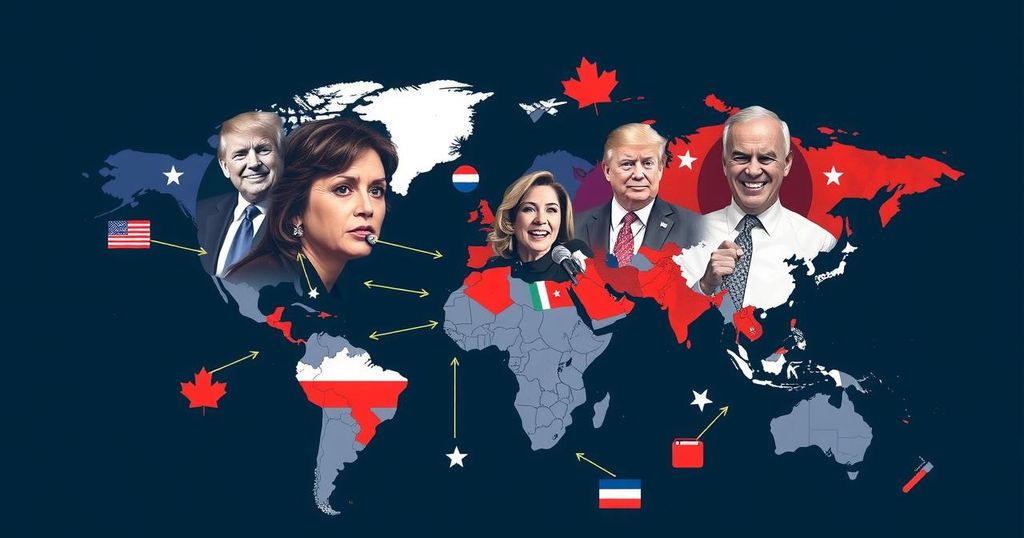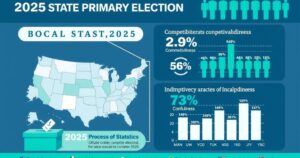Global Trends in Electoral Losses: Democrats Not Alone in Facing Challenges

Incumbent parties worldwide, including the Democratic Party in the U.S., faced significant losses as a result of widespread voter dissatisfaction with government performance. Over 80% of democracies holding elections this year saw incumbents lose seats or vote share. While the Democrats experienced milder losses compared to global counterparts, economic concerns and discontent were key factors impacting their campaign outcomes. The present climate sets the stage for Democrats as they prepare for future elections without incumbency.
The recent electoral landscape reveals that the challenges faced by incumbent parties are not unique to the Democratic Party in the United States; they reflect a broader global trend where incumbents across various democracies have encountered significant electoral losses. In various regions, over 80 percent of democracies with elections this year witnessed their incumbent parties either lose seats or diminish their vote share. Countries such as Japan, South Africa, and Senegal exemplify this phenomenon, where long-standing powers have been deposed or forced into reluctant coalitions. While the Democratic Party experienced losses, they were relatively moderate when compared to other nations grappling with similar issues. According to reports, Democrats have sustained one of the smallest losses in vote share amongst higher-income countries this election cycle, particularly considering Vice President Kamala Harris’s resolute campaigning in crucial swing states. A unique aspect of the U.S. electoral context lies in the comparatively robust economic performance of the nation despite global inflationary pressures and sluggish growth in many other democracies. American metrics, such as growing GDP and real wages, have showcased strength; however, public discontent regarding inflation and housing costs has overshadowed these accomplishments. Moreover, the few incumbent parties that managed to retain their influence did so predominantly by capitalizing on national security concerns, an emphasis that noticeably lacked in the recent U.S. campaign. As observed, economic unease and dissatisfaction regarding governmental direction significantly dampened the prospects of Democratic candidates. Nevertheless, as the cycle concludes, Democrats might find consolation in the fact that they may not face incumbency in the next election, potentially allowing for a new strategic approach moving forward.
Throughout the world, incumbent political parties have confronted difficult electoral environments, exacerbated by public dissatisfaction with government performance, particularly in the wake of the COVID-19 pandemic. A significant portion of the global populace expressed frustration with the economic conditions and governance, leading to notable election outcomes where incumbents lost their majority or faced substantial vote share declines. This pattern suggests that dissatisfaction with incumbents is a widespread phenomenon across democracies and not limited to any specific region or political party, including the Democratic Party in the United States. Specific instances, such as the electoral shift in nations like Japan and Botswana, illustrate the volatility present in established democracies. In the context of the U.S., despite enduring a relatively mild electoral setback, Democrats face similar issues of discontent and economic challenge that have affected voters globally, framing the next electoral phase as a pivotal moment for the party’s future.
The electoral outcomes observed in 2023 highlight a global trend of incumbent parties, including the Democrats, facing significant hurdles in the face of public dissatisfaction and economic challenges. While the Democratic losses were indeed less severe compared to those experienced by incumbents in other countries, the underlying issues of economic anxiety and governmental discontent significantly impacted voter sentiment. This situation underscores the likelihood that Democratic candidates will adapt their strategy moving forward, particularly as they prepare for the next electoral cycle without the burdens of incumbency.
Original Source: abcnews.go.com





